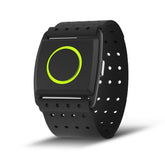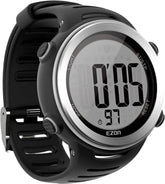12-Week Half Marathon Training Plan for Beginners
Training for your first half marathon is an exciting challenge that builds endurance, confidence, and mental toughness. This 12-week half marathon program is designed for beginner runners, focusing on gradual progress, injury prevention, and steady endurance development. With weekly schedules, pacing tips, and cross-training advice, you’ll be ready to conquer 13.1 miles with confidence.
Training Plan Basics
Goal: Finish your first half marathon injury-free, using a run-walk or steady-run approach.
Key Principles:
- Progressive Overload: Increase mileage by no more than 10% weekly to avoid burnout.
- Pacing Strategy: Start slow to build a 有氧 base, using a sports watch to maintain a comfortable pace.
- Rest and Recovery: Prioritize rest days and cross-training to allow muscles to repair.
Week 1–4: Base Building Phase
Goal: Establish a consistent running routine and build foundational endurance.
Weekly Structure:
- 3 Days of Running: Mix easy runs with run-walk intervals (e.g., 1 minute running, 1 minute walking).
- 1–2 Days of Cross-Training: Cycling, swimming, or yoga to improve mobility and reduce impact.
- 2 Rest Days: Light stretching or walking to aid recovery.
Sample Weekly Schedule:
| Day | Activity | Duration | Key Focus |
|---|---|---|---|
| Monday | Easy Run/Walk Intervals | 20–25 minutes | Form and consistency |
| Wednesday | Cross-Training (Cycling/Yoga) | 30–45 minutes | Full-body activation |
| Friday | Steady Run | 25–30 minutes | Gradual pace stabilization |
| Sunday | Long Run | 30–40 minutes | Building endurance foundation |
Pacing Tip: Use a GPS running watch to track pace and aim for a speed where you can speak in short sentences (approx 2–3 minutes slower per mile than your 5K pace).
Week 5–8: Distance Building Phase
Goal: Increase mileage and introduce hill/interval work to boost strength.
Weekly Structure:
- 3 Days of Running: Include one hill repeat session and one tempo run (slightly faster than easy pace).
- 1–2 Days of Cross-Training: Focus on low-impact activities like swimming or elliptical.
- 2 Rest Days: Prioritize foam rolling and recovery.
Sample Weekly Schedule:
| Day | Activity | Duration | Key Focus |
|---|---|---|---|
| Tuesday | Hill Repeats (4x1-minute climbs) | 20–25 minutes | Leg strength and power |
| Thursday | Tempo Run | 30–35 minutes | Sustained moderate effort |
| Saturday | Long Run | 50–60 minutes | Gradual distance increase |
Endurance Tip: Fuel with a banana or energy gel during long runs over 60 minutes to practice race-day nutrition.
Week 9–12: Peak and Taper Phase
Weeks 9–10: Peak Training
Goal: Reach your longest training run (10–12 miles) and simulate race conditions.
Weekly Structure:
- 3 Days of Running: One interval session, one race-pace practice, and a 10–12 mile long run.
- 1 Day of Cross-Training: Active recovery like walking or gentle yoga.
- 2 Rest Days: Prioritize sleep and hydration.
Sample Long Run:
- Pacing: Use a sports watch to run the first half at an easy pace, then gradually increase speed for the second half to practice negative splits.
Weeks 11–12: Taper Phase
Goal: Reduce mileage to allow full recovery while maintaining race-pace feel.
Weekly Structure:
- 3 Days of Running: Short, easy runs (20–30 minutes) and one 5–6 mile race-pace run.
- 1 Day of Cross-Training: Light activity to stay loose.
- 2 Rest Days: Mental preparation and gear check.
Key Taper Rule: Cut weekly mileage by 30–40%, but keep runs sharp with 5-minute race-pace segments to maintain leg turnover.
Pacing Tips for Race Day
1. Set a Realistic Goal Pace
- Calculate your target pace using a race-pace calculator or aim for 1.5–2 minutes per mile slower than your 10K pace.
2. Use a Pacing Strategy
- Run-Walk Method: Perfect for beginners (e.g., 3 minutes running, 1 minute walking) to avoid early burnout.
- Pace Alerts: Program your GPS running watch to vibrate if you start too fast—consistency is key!
3. Fuel and Hydrate Strategically
- During the Race: Take a gel or chew every 45–60 minutes and sip water/electrolyte drink at aid stations (don’t stop—walk through if needed).
Cross-Training and Strength Work
Why It Matters:
- Injury Prevention: Strengthens core, hips, and knees to support running mechanics.
- Recovery Enhancement: Low-impact activities boost blood flow without strain.
Recommended Workouts:
- Core Training: Planks, glute bridges, and side planks 2–3 times weekly.
- Yoga/Pilates: Improves flexibility and posture, critical for maintaining form during long runs.
- Cycling/Swimming: Active recovery that builds cardiovascular fitness without leg fatigue.
Essential Gear for Beginners
1. Supportive Running Shoes
- Choose a model with adequate cushioning and arch support—replace every 300–500 miles.
2. Sports Watch for Pacing
- EZON’s GPS series tracks pace, distance, and heart rate, helping you stay on target during training and race day.
3. Moisture-Wicking Apparel
- Avoid cotton to prevent chafing; opt for breathable fabrics for long runs.
Staying Motivated and Injury-Free
Motivation Tips:
- Join a Training Group: Connect with other beginner runners for accountability.
- Celebrate Milestones: Reward yourself for completing each phase of the plan.
Injury Prevention:
- Warm-Up/Cool-Down: Always start with 5–10 minutes of walking/jogging and finish with dynamic stretches.
- Listen to Your Body: Take an extra rest day if you feel tightness or pain—no single workout is worth an injury.
Race Week Checklist
- Day 7 (1 Week Out): 30-minute easy run, final gear check (shoes, watch, race belt).
- Day 3 (3 Days Out): 20-minute shakeout run, carb-loading with whole grains and veggies.
- Race Morning: Wake up early, eat a light breakfast (oatmeal, banana), and arrive at the start line 60–90 minutes early to avoid stress.
Final Words: You’re Ready to Shine
This 12-week half marathon program is more than a schedule—it’s a journey of growth. By following the plan, using smart pacing tips, and prioritizing recovery, you’ll build the endurance training needed to cross the finish line strong.
Remember, the goal is to finish feeling proud, not to chase a time. Trust your training, enjoy the process, and let your hard work pay off on race day. Lace up, stay consistent, and get ready to conquer your first half marathon!









